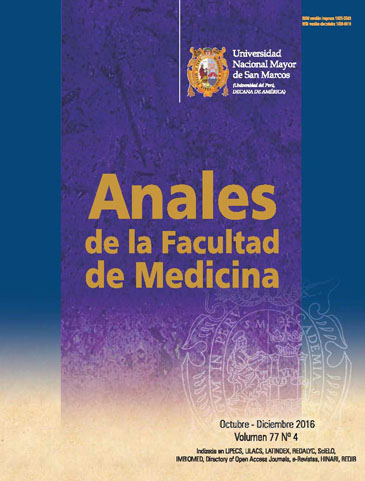Benefits and barriers perceived by pregnant women of different socioeconomic status of Lima by eating food of animal origen
DOI:
https://doi.org/10.15381/anales.v77i4.12651Keywords:
Benefits, Barriers, Foods of Animal Origin, Pregnant Women, Qualitative Research.Abstract
Introduction. Anemia in pregnant women is a public health problem in Peru. One strategy to prevent it is dietary diversity, including foods of animal origin (FAO), iron sources and other nutrients of high bioavailability. The benefits and perceived barriers to eat these foods may differ according to socioeconomic status. Objective. To compare the benefits and perceived barriers regarding eating food of animal origin (FAO) among pregnant women of different socioeconomic status. Design. Qualitative study, phenomenology design. Institution. A health establishment located in Carabayllo (low socioeconomic status: LSES) and another one in Magdalena del Mar (medium socioeconomic status: MSES). Sample. 20 pregnant women of each socioeconomic status, chosen by age, number of children, body weight. Interventions. In-depth interviews and focus groups after informed consent. Main outcome measures. Benefits and barriers of eating FAO during pregnancy: meats and derivatives, fish, dairy products and eggs. Results. We found more similar benefits than different ones among both groups of pregnant women. FAO had high nutritional value, were good for the baby and mother, prevented anemia, eggs and chicken were versatile and practical to prepare, fish and liver were more nutritious among meats. There were similar barriers: poor accessibility due to cost, distaste, infrequent consumption, poor safety and intense organoleptic characteristics (smell, taste). Confusion about nutritional value in LSES and little food preparation skills in MSES. Conclusions. Participating pregnant women of different socioeconomic status (medium and low) perceived more similarities than differences in benefits and barriers regarding eating FAO.Downloads
Published
2016-12-16
Issue
Section
Artículo Original
License
Copyright (c) 2016 Margot Rosario Quintana Salinas

This work is licensed under a Creative Commons Attribution-NonCommercial-ShareAlike 4.0 International License.
Those authors who have publications with this magazine accept the following terms:
- Authors will retain their copyrights and guarantee the journal the right of first publication of their work, which will be simultaneously subject to Creative Commons Attribution License that allows third parties to share the work as long as its author and its first publication this magazine are indicated.
- Authors may adopt other non-exclusive licensing agreements for the distribution of the version of the published work (eg, deposit it in an institutional electronic file or publish it in a monographic volume) provided that the initial publication in this magazine is indicated.
- Authors are allowed and recommended to disseminate their work over the Internet (eg: in institutional telematic archives or on their website) before and during the submission process, which It can produce interesting exchanges and increase quotes from the published work. (See El efecto del acceso abierto ).
How to Cite
1.
Quintana Salinas MR. Benefits and barriers perceived by pregnant women of different socioeconomic status of Lima by eating food of animal origen. An Fac med [Internet]. 2016 Dec. 16 [cited 2025 Jun. 7];77(4):351-6. Available from: https://revistasinvestigacion.unmsm.edu.pe/index.php/anales/article/view/12651



